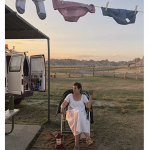Somewhere along the mid-19th century American East Coast frontier, two neighboring couples battle hardship and isolation, witnessed by a splendid yet testing landscape, challenging them both physically and psychologically.
Chuck says:
A worthy companion piece to Celine Sciamma’s Portrait of a Lady on Fire, Moan Fastvold’s The World to Come is an intimate look at loneliness and longing. A picture of two women trapped by their emotions and society, each is desperate to find a way to express their deepest thoughts and fine a modicum of solace in the harsh world they find themselves in. Driven by compelling performances from its two leads, the film succeeds in recreating the harsh conditions faced by settlers on the frontier in the mid-19th century, underscoring the sense of isolation that drive the two couples at its center to desperate lengths and behavior that goes against the societal norms of their age.
Struggling with the loss of their daughter, Dyer and Abigail (Casey Affleck & Katherine Waterston) find their marriage in tatters as they are each unable to speak about the tragedy that’s befallen them. Adding to their woes, the conditions on their farm in the wilds of New York state make every day a struggle. However, their mundane existence is disrupted when they meet Finney and Tallie (Christopher Abbott & Vanessa Kirby), a nomadic couple who have taken up residency on a neighboring farm they’ve let. Recognizing a sense of weariness and isolation in each other, the women strike up a friendship that soon blossoms into an intimate relationship, both emotionally and physically, each finding the kindred spirit they’ve been seeking to ease their mutual loneliness.
Fastvold allows the story to breath, the respective marriages revealing the flaws that plague them through pregnant silences as much as confrontations. The damage each of the four protagonists contend with comes out through furtive glances, hushed conversations and finally tragic circumstances that prove shocking, though moments that foreshadow it are provided throughout. The remote area in Romania where the film was shot certainly contributes to the sense of isolation that looms over the story but so does the actors’ quiet approach to their roles. The tentative nature of the characters, the resistance to reveal any intimacies, are displayed through the cast’s performances, all of them couched in hesitancy.
Waterston and Kirby are both magnificent here, each of them conveying the sense of hopelessness that plagues their characters and the hope that is their salvation with sincerity and passion. Their chemistry is palpable, fierce. And while the film focuses on the women at its center, their respective husbands have not been immune to the effects of solitude. Dyer is eager to express himself yet is unsure how honest he should be or how any of his revelations will be received. Affleck’s understated approach brings a palpable poignancy to his character’s suffering in silence. Abbott is required to take a different approach as Finney’s behavior speaks to far darker thoughts and intent, his bitterness over the state of his marriage barely contained, speaking to a potentially dire set of circumstances, the actor not shying away from the character’s unsavory qualities.
The fate of these four characters is affected not simply by their environment but also by the gender roles and societal mores of the era they live in. This hobbles them in numerous ways which prevent them from establishing the sort of intimacy necessary for them to survive in the physical and emotional wilderness they find themselves in. Lyrical and haunting, The World to Come, speaks to the difficulties those burdened with foresight are destined to suffer at the hands of those who blindly adhere to tradition, lacking the ability to think beyond the norm.
3 1/2 Stars




